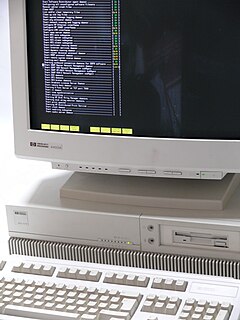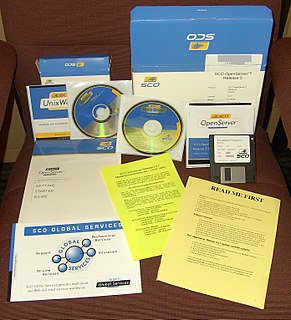Related Research Articles

GNU is an operating system and an extensive collection of computer software. GNU is composed wholly of free software, most of which is licensed under the GNU Project's own General Public License (GPL).

XENIX is a discontinued version of the UNIX operating system for various microcomputer platforms, licensed by Microsoft from AT&T Corporation in the late 1970s. The Santa Cruz Operation (SCO) later acquired exclusive rights to the software, and eventually replaced it with SCO UNIX.

SCO Group, Inc. v. International Business Machines Corp., commonly abbreviated as SCO v. IBM, is a civil lawsuit in the United States District Court of Utah. The SCO Group asserted that there are legal uncertainties regarding the use of the Linux operating system due to alleged violations of IBM's Unix licenses in the development of Linux code at IBM. The lawsuit was filed in 2003, it has lingered on through the bankruptcy of SCO Group and the adverse result in SCO v. Novell, and was reopened for continued litigation by order of a new judge on June 14, 2013. Pursuant to the court order reopening the case, an IBM Motion for Summary Judgment was filed based upon the results of the Novell decision. On December 15, 2014, the judge granted most of IBM's motion, thereby narrowing the scope of the case, which remained open. On March 1, 2016, following the judge in the case ruling against the last remaining claims, SCO's suit against IBM was dismissed with prejudice; SCO then filed an appeal later that month. In February 2018, as a result of the appeal and the case being (partially) remanded to the circuit court, the parties restated their remaining claims and provided a plan to move toward final judgement.

SCO, The SCO Group, and The TSG Group are the various names of an American software company that became known for acquiring the Santa Cruz Operation's Server Software and Services divisions, and UnixWare and OpenServer technologies, and then, under CEO Darl McBride, pursuing a series of legal battles known as the SCO-Linux controversies.

Caldera International, earlier Caldera Systems, was an American software company that existed from 1998 to 2002 and developed and sold Linux- and Unix-based operating system products.
Santa Cruz Operation (SCO) was a software company based in Santa Cruz, California which was best known for selling three Unix variants for Intel x86 processors: Xenix, SCO UNIX, and UnixWare. Eric Raymond, in his book The Art of Unix Programming, calls SCO the "first Unix company". Prior to this, some prominent Unix vendors had been computer hardware manufacturers and telephone companies.

UnixWare is a Unix operating system. It was originally released by Univel, a jointly owned venture of AT&T's Unix System Laboratories (USL) and Novell. It was then taken over by Novell. Via Santa Cruz Operation (SCO) it went on to Caldera Systems, Caldera International, and The SCO Group before it was sold to UnXis. UnixWare is typically deployed as a server rather than a desktop. Binary distributions of UnixWare are available for x86 architecture computers. UnixWare is primarily marketed as server operating system.

UNIX System V is one of the first commercial versions of the Unix operating system. It was originally developed by AT&T and first released in 1983. Four major versions of System V were released, numbered 1, 2, 3, and 4. System V Release 4 (SVR4) was commercially the most successful version, being the result of an effort, marketed as Unix System Unification, which solicited the collaboration of the major Unix vendors. It was the source of several common commercial Unix features. System V is sometimes abbreviated to SysV.
The SCO–Linux disputes are a series of legal and public disputes between the software company SCO Group (SCO) and various Linux vendors and users. The SCO Group alleges that its license agreements with IBM means that source code that IBM wrote and donated to be incorporated into Linux was added in violation of SCO's contractual rights. Members of the Linux community disagree with SCO's claims; IBM, Novell and Red Hat have ongoing claims against SCO.

Xinuos OpenServer, previously SCO UNIX and SCO Open Desktop, is a closed source computer operating system developed by Santa Cruz Operation (SCO), later acquired by SCO Group, and now owned by Xinuos. Early versions of OpenServer were based on UNIX System V, while the later OpenServer 10 is based on FreeBSD.

Project Monterey was an attempt to build a single Unix operating system that ran across a variety of 32-bit and 64-bit platforms, as well as supporting multi-processing. Announced in October 1998, several Unix vendors were involved; IBM provided POWER and PowerPC support from AIX, Santa Cruz Operation (SCO) provided IA-32 support, and Sequent added multi-processing (MP) support from their DYNIX/ptx system. Intel Corporation provided expertise and ISV development funding for porting to the new IA-64 platform, which had not yet been released at that time. The focus of the project was to create an enterprise-class UNIX for the IA-64, which at the time was expected to eventually dominate the UNIX server market.

The history of Unix dates back to the mid-1960s when the Massachusetts Institute of Technology, AT&T Bell Labs, and General Electric were jointly developing an experimental time sharing operating system called Multics for the GE-645 mainframe. Multics introduced many innovations, but had many problems.
Caldera OpenLinux (COL) is a defunct Linux distribution that was originally introduced by Caldera in 1997 based on the German LST Power Linux distribution, and then taken over and further developed by Caldera Systems since 1998. A successor to the Caldera Network Desktop put together by Caldera since 1995, OpenLinux was an early "business-oriented distribution" and foreshadowed the direction of developments that came to most other distributions and the Linux community generally.
vsftpd,, is an FTP server for Unix-like systems, including Linux. It is licensed under the GNU General Public License. It supports IPv6, TLS and FTPS. It is the default FTP server in the Ubuntu, CentOS, Fedora, NimbleX, Slackware and RHEL Linux distributions.
In Unix computing, lxrun is a compatibility layer to allow Linux binaries to run on UnixWare, SCO OpenServer and Solaris without recompilation. It was created by Mike Davidson. It has been an open source software project since 1997, and is available under the Mozilla Public License. Both SCO and Sun Microsystems began officially supporting lxrun in 1999.
Smallfoot was the name of both a rapid application development toolkit and an embedded operating system designed and released by Caldera Systems/Caldera International/The SCO Group in both UnixWare and Linux formats. Created for use in embedded environments such as point of sale systems and video gaming, the toolkits were intended to create specifically tailored operating systems geared towards the desired use. These customized and stripped down versions of the operating systems made less of a footprint, hence the names Smallfoot embedded UNIX and Smallfoot embedded Linux respectively.
Linux began in 1991 as a personal project by Finnish student Linus Torvalds: to create a new free operating system kernel. The resulting Linux kernel has been marked by constant growth throughout its history. Since the initial release of its source code in 1991, it has grown from a small number of C files under a license prohibiting commercial distribution to the 4.15 version in 2018 with more than 23.3 million lines of source code, not counting comments, under the GNU General Public License v2.

Unix is a family of multitasking, multiuser computer operating systems that derive from the original AT&T Unix, development starting in the 1970s at the Bell Labs research center by Ken Thompson, Dennis Ritchie, and others.

SCO Forum was a technical computer conference sponsored by the Santa Cruz Operation (SCO), briefly by Caldera International, and later The SCO Group that took place during the 1980s through 2000s. It was held annually, most often in August of each year, and typically lasted for much of a week. From 1987 through 2001 it was held in Santa Cruz, California, on the campus of the University of California, Santa Cruz. The scenic location, amongst redwood trees and overlooking Monterey Bay, was considered one of the major features of the conference. From 2002 through 2008 it was held in Las Vegas, Nevada, at one of several hotels on the Las Vegas Strip. Despite the name and location changes, the conference was considered to be the same entity, with both the company and attendees including all instances in their counts of how many ones they had been to.
References
- SCO Skunkware website
- SCO Skunkware SCO Forum 1998
- Open Source and SCO SCO Forum 2000
- Open Source BOF SCO Forum 2002
- Open Source Components in SCO OpenServer and SCO UnixWare SCO Forum 2004
- Open Source and SCO SCO Forum 2005
- Open Source at SCO SCO Forum 2006
- Mohr, Jim (May–June 2000). "Free Network Software from SCO". SCO World. Mountain View, CA 94040: Venture Publishing Inc. 7 (3). Archived from the original on 2001-02-28. Retrieved 2008-05-13.
- SCO, Skunkware, and the Open Source Movement SCO World magazine February 1, 1999
- Porting Open Source Software to SCO SCO World magazine November 1, 1999
- Sorfa, Petr (March–April 2000). "Application Development With the KDevelop IDE". SCO World. Mountain View, CA 94040: Venture Publishing Inc. 7 (2). Archived from the original on 2001-01-07. Retrieved 2008-05-13.
- About SCO World magazine at archive.org
- Leibovitch, Evan (January–February 2000). "Linux and SCO: Testing Open Source Waters". SCO World. Mountain View, CA 94040: Venture Publishing Inc. 7 (1). Archived from the original on 2000-10-07. Retrieved 2008-05-13.
- Gerber, Boyd. "SCO Skunkware mirror at zenez.com". ZENEZ Consulting. Retrieved 2008-05-13.[ permanent dead link ]
- Lawrence, Anthony. "What Is Skunkware ?". APLawrence.com. Retrieved 2008-05-13.
- Merrill, Andrew; Billy G. Allie. "Frequently Asked Questions (FAQ) for PostgreSQL". PostgreSQL Global Development Group. Archived from the original on 2008-02-26. Retrieved 2008-05-13.
- "SCO Skunkware CD-ROM ISO images". debian.org. Retrieved 2008-05-13.[ dead link ]